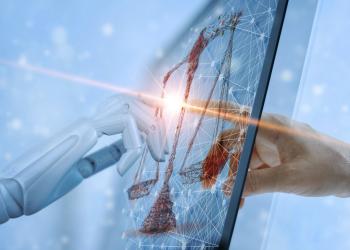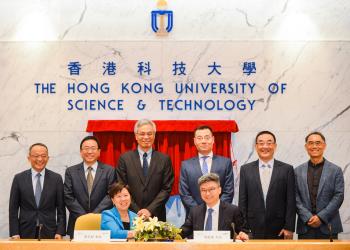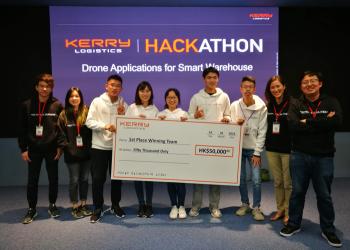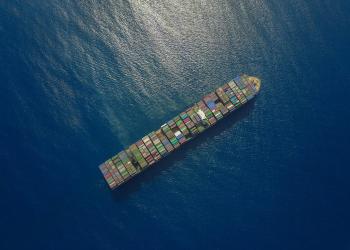News & Stories
2019

News
Let's Clear the Fog over Central Tolls
By Lo Hong-kam, Head and Chair Professor of Civil & Environmental Engineering, HKUST
Hong Kong is no stranger to traffic congestion and the government has mulled over introducing electronic road pricing in Central since the 1980s and public engagement over ERP was completed in 2016, but some vocal stakeholders, mainly private vehicle owners, have stymied such plans for decades.
I believe both policymakers and the media have failed the public by centering discussions on how a potential ERP system would impact on private car users when they are the minority in using the transportation system.
Only 10 percent of trips in Hong Kong use private cars and the rest rely on public transportation.
Let me explain why implementing ERP in Central would bring positive impact to the traveling public.

News
Robo-lawyer: Your AI Conflict Resolution
Getting a divorce is hard, but going through paperwork and court proceedings can leave a deeper scar. A team of HKUST’s Computer Science and Engineering (CSE) students, supervised by professors and alumnus, has developed a “robo-lawyer” that not only saves time and money, but also paves the way for wider application of artificial intelligence technologies in the legal profession.
Hong Kong’s divorce rate in 2016 was more than double that in 1991. The rising demand for family mediation has been a mounting challenge for Albert SO, a CSE alumnus from HKUST, who chairs the Hong Kong Mediation and Arbitration Centre. Few divorcing couples actually realized that the high legal costs and procedural drag would take an emotional toll on themselves, says Albert. Many of them are unwilling or unable to sit down for a mediation that could take months or years, especially for cross-border couples.

News
HKUST and WeBank Launch First HK-Guangdong Joint Laboratory in Banking
The Hong Kong University of Science and Technology (HKUST) and WeBank Co. Ltd (WeBank) have established the HKUST-WeBank Joint Laboratory to nurture talent and explore cutting-edge technologies. Leveraging on both parties’ advantages in research and knowledge transfer in the Greater Bay Area (GBA), the joint lab will collaborate on areas spanning artificial intelligence (AI), big data, blockchain as well as financial and regulatory technologies. This collaboration also serves as a high-level collaborative innovation platform for enterprises, universities and research institutes to promote knowledge transfer under the GBA Development Framework.

News
Engineering Student Team Crowned Champion at Smart Warehouse Hackathon
A team of 5 HKUST School of Engineering (SENG) students brought home the championship at the Kerry Logistics Hackathon in February, a competition that sought to explore the possibility of using drones to help run smart warehouses.
Joined by 50 local undergraduate and postgraduate students in 8 groups, as well as 50 industry participants, the competition comprised two sessions.
In the “Drone Flying Competition” session, contestants had to create the best path for the drone to race and capture information about the warehouse at the Kerry Cargo Centre in Kwai Chung, by leveraging the power of autonomous drones and Artificial Intelligence (AI) techniques in this 24-hour overnight hackathon. Contestants were judged on criteria such as how accurate, efficient, stable and well-planned their drone flights were.

News
High Time for Clarity on Sea Emissions
By Prof. Ning Zhi, Associate Professor of Environment and Sustainability
Marine emissions account for 40 percent of air pollution sources in Hong Kong - making them one of the city's most significant pollutant sources.
Given the SAR's status as one of the busiest ports in the world, enforcing clean fuel laws is absolutely essential in our quest to clean up our air.
Traditionally, policing high sulfur fuel usage is a time-consuming affair: checking ship logs, collecting samples from fuel tanks, taking them back to the lab and then conducting analyses. This process takes days and even weeks.
By the time these measurements are complete, the ships are likely to be already far from Hong Kong.
Regulators have been looking for a more efficient solution to detect and screen the vessels violating the fuel sulfur cap regulations.
News
HKUST Collaborates with China Everbright Bank to Nurture Cyber Security Talent
The School of Business and Management of The Hong Kong University of Science and Technology (HKUST Business School) joined hands with China Everbright Bank Hong Kong Branch (CEBHK) to organize the bank’s first academic-industry collaborated cyber security competition for students.
Amid the growing threats of cyber attacks, the competition “Cyber Defenders Challenge – Team Up for the Good Fight” aimed to promote cyber security awareness and provide an opportunity for students at HKUST to address some real-world threats faced by information security experts.
The full-day event was held at HKUST on May 10, where IT experts from CEBHK were invited to provide training and share their real-life experiences in protecting their customers from hackers and compliance of best practices. Cybersecurity Company Fortinet provided technical support for the competition.

News
MoC Signed between HKUST and ZA International to Strengthen Collaboration in Fintech and Insurtech
The School of Business and Management of The Hong Kong University of Science and Technology (HKUST Business School) and ZhongAn Technologies International Group Ltd (ZA International) signed a Memorandum of Cooperation (MoC) to open up a new stream of opportunities for faculty and students in the fields of Fintech and Insurtech.
The HKUST Business School aspires to become a major intellectual powerhouse of Fintech in Asia and is undertaking a major Fintech research project funded by the Research Grants Council under its Theme-based Research Scheme. The project examines the impacts of Fintech on Hong Kong and looks into ways to contribute to the development of the city into a global Fintech hub.

News
Whole New Worlds in This Event Horizon
By Henry Tye and Wang Yi, Chair Professor of Physics and IAS Professor; Assistant Professor of Physics, HKUST
Scientific breakthroughs do not always make the front pages, but when an image of a black hole was released in mid-April, it became a headliner for days.
What makes this photo so fascinating? There are multiple reasons.
First, it is the first time humanity succeeded at photographing a black hole; in the past, scientists only inferred its existence from the effect black holes exert on their neighbors via its gravitational waves.
Second, this picture confirms a number of theories we have long believed about these mysterious objects.
People often ask: "How do you see a black hole?"
Thanks to the immense energy emitted by its spinning accretion disk, this cosmological wonder is actually one of the brightest objects in the universe.








